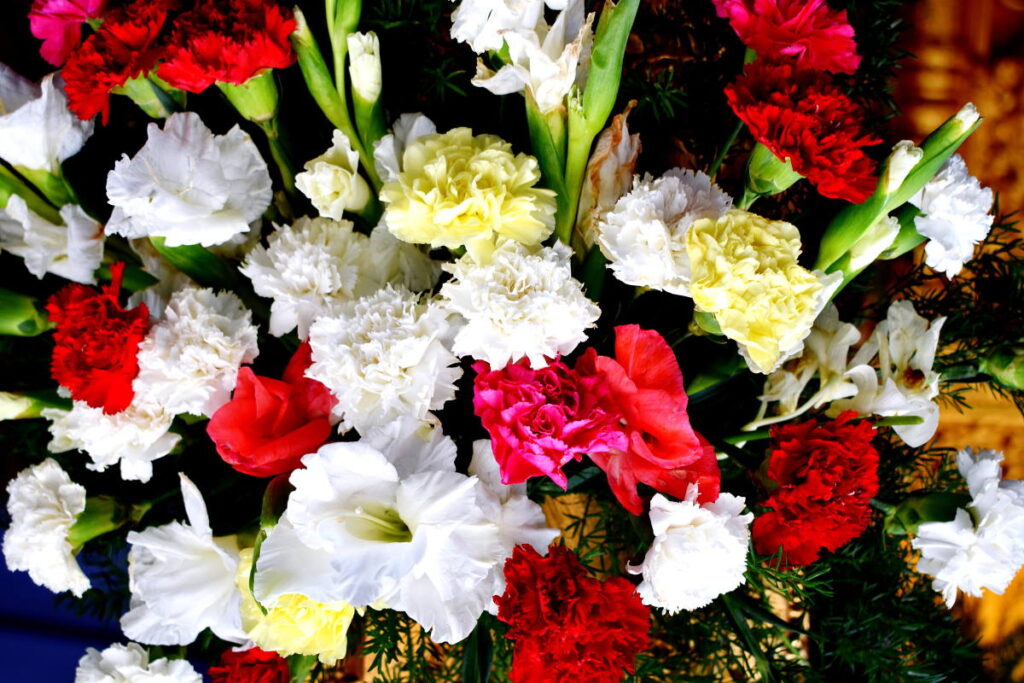The season is over, and those beautiful flowers aren’t looking so good. They’re drying out, and it’s time to get rid of them. Before you throw them out, you wonder – can you compost flowers? Of course, you can! After all, they’re organic material; as we learned in The Lion King, it’s the Circle of Life.
Flowers are made up of the very things that we use compost for. They have carbon, nitrogen, and numerous other nutrients. Composting flowers are a wonderful addition to your compost pile.
How To Compost Flowers?
As with many things, you want to cut your flowers up. Try to separate live parts and dead parts.
If they have a bulb, separate that. Bulbs are very hardy (they live in the ground, after all), so if you want to compost them, you need to cut them up into small parts. If you don’t want to do that, you might want just to toss them. Otherwise, they may germinate and grow flowers in the fertile compost, similar to when you compost weeds.
Then, layer your flower parts with other green materials. Flowers often have a carbon (or brown) component, but we call them green for simplicity. Layer them between brown material layers. Generally speaking, live flowers that you compost are richer in nitrogen, which makes them green. Dead flowers are richer in carbon, which makes them brown. Either way, flowers that you add to your compost have a good mix of nutrients, including both nitrogen and carbon. This is part of why it’s such a benefit when you compost flowers.
Turn the compost every few days to aerate it. This ensures that your compost has oxygen and moisture spread throughout.
You might want to remove the thorny parts if the flower has thorns. They don’t break down as quickly, and when you have your hands in your compost pile, you don’t want to get poked with the remains of a thorn.

Flowers to Be Careful Within Compost
There are a few times that you are better off not composting some flowers. Here are a few scenarios to avoid –
- Flowers that Might Be Diseased – If the flower died because of a disease or parasite, you don’t want to add that back into your compost and your garden. It will just spread.
- Commercial Flowers That Have Been Treated with Pesticides – These pesticides are toxic to the organisms in your compost pile. Many commercial flowers are treated, including the ones you put in the vase with the little packet. That little packet often has a bacteriacide that might kill off the helpful bacteria in your compost pile.
- Flowers with Thorns – These are annoying and could hurt you when working in your compost pile.
For the most part, it’s safe and beneficial to include flowers, both dead and alive, in your compost pile. These are a few times you might want to avoid adding these flowers.
Can I Compost Flowers?
Yes, you can, and you should. Adding flowers, both dead and alive, to your compost can help to add nitrogen and carbon. Flowers have all the nutrients we want to decompose and add to our garden.
Frequently Asked Questions about Adding Flowers to Compost
Can You Compost Dead Flowers?

Yes, you can compost dead flowers basically the same way as with live flowers.
Can You Compost Live Flowers?

You sure can. Cut them up and add them to the compost between layers of brown material.
Are Flowers Brown or Green?
There isn’t a straight answer on this because they’re really both. For the most part, live flowers and parts are green material. Dead flowers are brown material.
